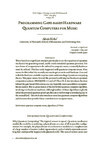Programming gate-based hardware quantum computers for music
| dc.contributor.author | Kirke, Alexis | |
| dc.date.accessioned | 2022-06-21T11:02:53Z | |
| dc.date.available | 2022-06-21T11:02:53Z | |
| dc.date.issued | 2018 | |
| dc.identifier.issn | 2406-0976 | |
| dc.identifier.issn | 2406-0976 | |
| dc.identifier.uri | http://hdl.handle.net/10026.1/19332 | |
| dc.description.abstract |
There have been significant attempts previously to use the equations of quantum mechanics for generating sound, and to sonify simulated quantum processes. For new forms of computation to be utilized in computer music, eventually hardware must be utilized. This has rarely happened with quantum computer music. One reason for this is that it is currently not easy to get access to such hardware. A second is that the hardware available requires some understanding of quantum computing theory. This paper moves forward the process by utilizing two hardware quantum computation systems: IBMQASM v1.1 and a D-Wave 2X. It also introduces the ideas behind the gate-based IBM system, in a way hopefully more accessible to computer literate readers. This is a presentation of the first hybrid quantum computer algorithm, involving two hardware machines. Although neither of these algorithms explicitly utilize the promised quantum speed-ups, they are a vital first step in introducing QC to the musical field. The article also introduces some key quantum computer algorithms and discusses their possible future contribution to computer music. | |
| dc.format.extent | 21-37 | |
| dc.language | en | |
| dc.language.iso | en | |
| dc.publisher | Serbian Academy of Sciences and Arts - Institute of Musicology of Serbian Academy of Sciences and Arts | |
| dc.title | Programming gate-based hardware quantum computers for music | |
| dc.type | journal-article | |
| plymouth.issue | 24 | |
| plymouth.publication-status | Published | |
| plymouth.journal | Muzikologija | |
| dc.identifier.doi | 10.2298/muz1824021k | |
| plymouth.organisational-group | /Plymouth | |
| plymouth.organisational-group | /Plymouth/Faculty of Arts, Humanities and Business | |
| plymouth.organisational-group | /Plymouth/Faculty of Arts, Humanities and Business/School of Society and Culture | |
| plymouth.organisational-group | /Plymouth/REF 2021 Researchers by UoA | |
| plymouth.organisational-group | /Plymouth/REF 2021 Researchers by UoA/UoA33 Music, Drama, Dance, Performing Arts, Film and Screen Studies | |
| plymouth.organisational-group | /Plymouth/Users by role | |
| plymouth.organisational-group | /Plymouth/Users by role/Academics | |
| dcterms.dateAccepted | 2018-05-07 | |
| dc.rights.embargodate | 2022-6-22 | |
| dc.identifier.eissn | 2406-0976 | |
| dc.rights.embargoperiod | Not known | |
| rioxxterms.versionofrecord | 10.2298/muz1824021k | |
| rioxxterms.licenseref.uri | http://www.rioxx.net/licenses/all-rights-reserved | |
| rioxxterms.type | Journal Article/Review |


